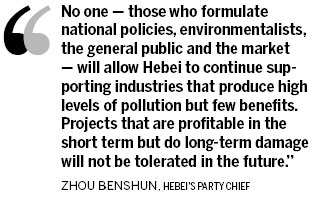Hebei aims for pollution fight to bear fruit
Updated: 2013-12-26 08:54
By Wu Wencong in Beijing and Zheng Jinran in Tangshan (China Daily)
|
|||||||||||
|
|
Tough remedies
The worst pollution requires the toughest remedies, so although the government has ordered that all blast furnaces of 400 cubic meters or less be dismantled, Hebei has implemented its own standard of 1,000 cu m.
"Although 75 percent of the steel produced in Qian'an is made in furnaces larger than the national standard, some businesses may still be affected because the provincial government is aiming to dismantle 80 percent of furnaces smaller than 1,000 cubic meters," said Zhang Shuyun, the mayor of Qian'an, a county level city affiliated with Tangshan.
In addition to reducing production capacity, Hebei has also introduced policies, including consolidation through mergers and company restructuring, that will result in the number of steel companies in the province falling by 60 percent, according to information provided by the Hebei Development and Reform Commission.
Seventeen private steel companies in Wu'an, a county-level city in Hebei, will be merged to create three large entities, which will then be relocated from the downtown area to an industrial park 30 km south of the city. The move will cut total annual production to 7 million tons from 10 million after the restructuring.
"My company's total investment in buildings and equipment has been 4 billion yuan in the last 30 years. But once we move, it will be worth no more than 10 percent of that amount," said Yao Mingfang, chairman of the board at Mingfang Steel Ltd, one of the three giant companies created by the consolidation plan.
Yao said the 17 companies will suffer a combined loss of at least 3 billion yuan when production is cut by 30 percent, and that doesn't take into account the physical and legal costs of transferring the companies.
The reduction in capacity will see the provincial economy lose more than 90 billion yuan per annum, and the income raised by local taxes - more than 200 billion yuan in 2012 - will fall by approximately 16 billion yuan, according to the Hebei DRC.
The tough measures will eventually provide cleaner air, but they will also result in a large number of Hebei residents losing their jobs.
Approximately 600,000 people will be affected and although the steel sector will lose approximately 200,000 jobs, related and service industries such as logistics, hotels and catering will also be hit, said Chen Yongjiu, head of the Hebei DRC.
Transferring the 200,000 people currently working in the core industry to new jobs will cost an estimated 2.6 billion yuan, he said.
Although State-owned companies traditionally absorb the lion's share of job reductions because they employ so many people, it is easier for them to move into other areas of production if change is required.
Today's Top News
Anger over Abe's World War II shrine visit
'An overall view' on Mao required
Factories halted to clear air in Beijing
China's urbanization rate to hit 60% by 2018
Foreign patients treated like natives
Couples who lose a child to receive higher subsidies
Arafat died of natural causes: Russia
Turk PM announces major cabinet reshuffle
Hot Topics
Lunar probe , China growth forecasts, Emission rules get tougher, China seen through 'colored lens', International board,
Editor's Picks

|
|

|

|

|

|







